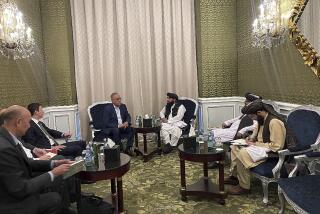Unity Bid by Afghan Rebel Factions Dissolves in Chaos
ISLAMABAD, Pakistan — Shouting “Long Live the moujahedeen, “ 420 leaders of the deeply divided Afghan Islamic resistance gathered here Friday at a heavily guarded meeting that had been billed as a final attempt to form a unified government to take power in Afghanistan if the Soviet-backed regime there falls.
Rather than unity, though, the meeting of rebel commanders, tribal leaders and Afghan intellectuals living in exile produced chaos, ending half an hour after the opening prayers and chants. A spokesman for the rebels, who call themselves moujahedeen or “holy warriors,” said the much-anticipated shoora --the word for a traditional meeting of Afghan leaders--was “postponed indefinitely.” Delegates left unsure whether it will reconvene.
The assembly, which had been endorsed strongly by the U.S. and Pakistani governments, both of which aided the rebels in their 9-year war against Afghanistan’s Marxist government and the Soviet troops supporting it, was almost not convened at all.
Bitter last-minute infighting Thursday night triggered boycott threats by moderate members of the largely fundamentalist, seven-party rebel alliance that was formed three years ago largely to distribute U.S.-financed arms and aid to rebel commanders through Pakistan.
It remained unclear whether the moderate factions, which are more popular with the 5 million Afghan refugees in Pakistan and Iran and many of their 9 million countrymen still living inside their nation, would continue to participate in the shoora .
Western diplomats and Pakistani officials, who viewed the shoora as a critical, last-minute attempt to avoid a bloody civil war in Afghanistan after the Soviets troops complete their withdrawal next week, remained hopeful, though, that the assembly still can endorse a credible, coalition government.
“I think the result could be a lot better than the process that brought it about,” one Western diplomat said when asked about the chaos surrounding the shoora Friday. “Unless it’s absolutely wired (by the fundamentalists), something good could come out of it.”
Clearly, though, even the governments that are most interested in seeing a peaceful settlement to the war, which already has left as many as 1 million dead, concede that a successful assembly is crucial if international aid to the rebels is to continue after the Soviet withdrawal.
“The degree of outside support for the Afghan resistence after the Soviets are gone will diminish if nothing comes out of the shoora ,” said one senior Western diplomat. “There is also the psychology of it. It will be easier to get the (Soviet-backed) regime in the major cities to surrender if you have something there to replace it.
“If there isn’t anything that emerges from the shoora , you have nothing to negotiate with.”
However, interviews this week with moderate Afghans, historians and scholars made it clear that the shoora itself is extremely unpopular, even among the millions of civilian refugees who have supported and participated in the moujahedeen’s “holy war.”
Violation of Tradition?
Critics viewed the assembly as a violation of Afghan tradition that was being forced on them by Pakistan, the United States and Saudi Arabia through the heavily armed, Islamic fundamentalist political parties that the three governments have used as the main conduits in the multibillion-dollar arms pipeline to the rebels.
“America again is taking the wrong policy in this,” declared Ghulam Khan Waziri, a senior official of the moderate Afghan National Liberation Front party headed by Sibghatullah Mojadidi.
“We are struggling not only with the Soviet Union. We are struggling with our other neighbors and any other power that tries to impose on us. We want our freedom. We don’t want to be a puppet to this regime or that regime.”
The moderates view the fundamentalist parties that hold the majority in the alliance as political thugs who already have lost the support of the local guerrilla commanders they armed during the war, Waziri and others said.
In fact, many of the commanders and tribal leaders, the traditional authorities in Afghan society, refused to attend the shoora Friday. Several Afghan intellectuals cited that as proof that the shoora ultimately will lack popular endorsement.
The diplomats who support the assembly concede that the parties have lost much of their support from the local commanders. Several speculated that the seven-party alliance easily could become meaningless, regardless of the shoora’s outcome.
Noting the widespread dissent within the rebel alliance, a senior Western diplomat said, “The thing that has brought them all together for the last two weeks and gotten to the point of a shoora is the fear that they may become irrelevant.”
Another diplomat indicated the the U.S. and Pakistani governments are aware of the growing anti-Americanism within the rebel movement.
“What everyone is hearing from the commanders and the intellectuals is a growing rejection of any foreign influence,” he said. “And those commanders and political leaders who have profited directly from foreign assistance are now going to be proportionately hurt when they cross back into Afghanistan.”
Although they conceded the likelihood of the ultimate collapse of the alliance, and, even any government that emerges from the shoora , most diplomats stressed that it is still a key move to avoid the outcome of a Lebanon-style civil war.
“It is a psychological tool--the perception of an alternative,” the senior diplomat said. “And now, you’re really talking a much more psychological war than a military one.”
More to Read
Sign up for Essential California
The most important California stories and recommendations in your inbox every morning.
You may occasionally receive promotional content from the Los Angeles Times.









